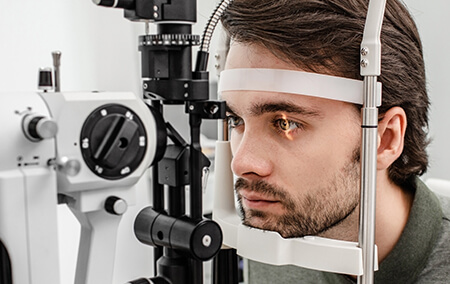

Your vision is vital to how you experience the world around you. Routine eye care is as critical as seeing your primary care physician for a physical or your dentist for cleanings.
Making your eyes a priority is a must, no matter how old you are. At Society Hill Ophthalmic Associates, you’ll find that our team provides state-of-the-art, individualized, compassionate eye care to all our patients.

Routine eye care starts by scheduling an eye exam with your ophthalmologist. Regular eye exams are the only way your eye doctor can keep your eyes healthy and diagnose any eye conditions.
This is especially crucial for conditions that don’t have symptoms like glaucoma. During your eye exam, you may experience the following:
Before your eye exam begins, your eye doctor will ask you to review your medical history. They’ll also ask you to review any medications you’re taking and if you already wear glasses or contact lenses.
To test your visual acuity, your ophthalmologist will have you read from an eye chart. Reading from the chart helps determine how well you can see from different distances and whether you have 20/20 vision.
If you wear glasses or contact lenses, your ophthalmologist will test your current prescription. They’ll have you look at an eye chart through a phoropter.
A phoropter is a device that contains different lenses and helps determine your best prescription. If you don’t already wear glasses or contacts, your eye doctor may conclude that you need visual aids after using the phoropter.
Another thing checked during an eye exam is how your pupils respond to light. Your eye doctor will shine a bright light into your eye to see if your pupils get smaller. If they don’t react or widen, it may reveal an underlying condition that requires treatment.
Although there are few discernible symptoms of glaucoma, one is the loss of peripheral vision. Your ophthalmologist at Society Hill Ophthalmic Associates may test your peripheral vision to ensure its functioning.

Using a slit-lamp microscope allows your ophthalmologist to access the front of your eye, including your eyelids, iris, lens, and cornea. The microscope checks for cataracts or any corneal abrasions.
During an ocular motility test, your eye doctor will evaluate how your eyes move and see if they are aligned. An ocular motility test also helps demonstrate that your eye muscles are working.
Tonometry helps measure the pressure inside your eye (also known as intraocular pressure or IOP). Testing your IOP shows your pressure isn’t too high, which can be a sign of glaucoma.
If necessary, your ophthalmologist will use dilating eye drops to widen your pupil. By dilating your pupils, they can see your optic nerve and retina, allowing them to check for any signs of damage.
The answer of how often to see your eye doctor for an eye exam depends on the patient. Adults should have complete eye exams once in their twenties and twice in their thirties.
However, if you have a history of eye disease, experience eye pain, or wear glasses or contact lenses, talk to your ophthalmologist. They can set you up with the best schedule for routine eye care.
By age 40, adults should have a complete eye exam, as this is when early signs of disease may start. At 65, you’ll want to see your eye doctor for an annual eye exam.
At this age, they’ll start checking for age-related eye conditions like cataracts, glaucoma, age-related macular degeneration, and diabetic retinopathy. If you notice any sudden vision changes, let your eye doctor know no matter how old you are.
Do you need to schedule a routine eye exam? Request an appointment at Society Hill Ophthalmic Associates in Philadelphia, PA, today!